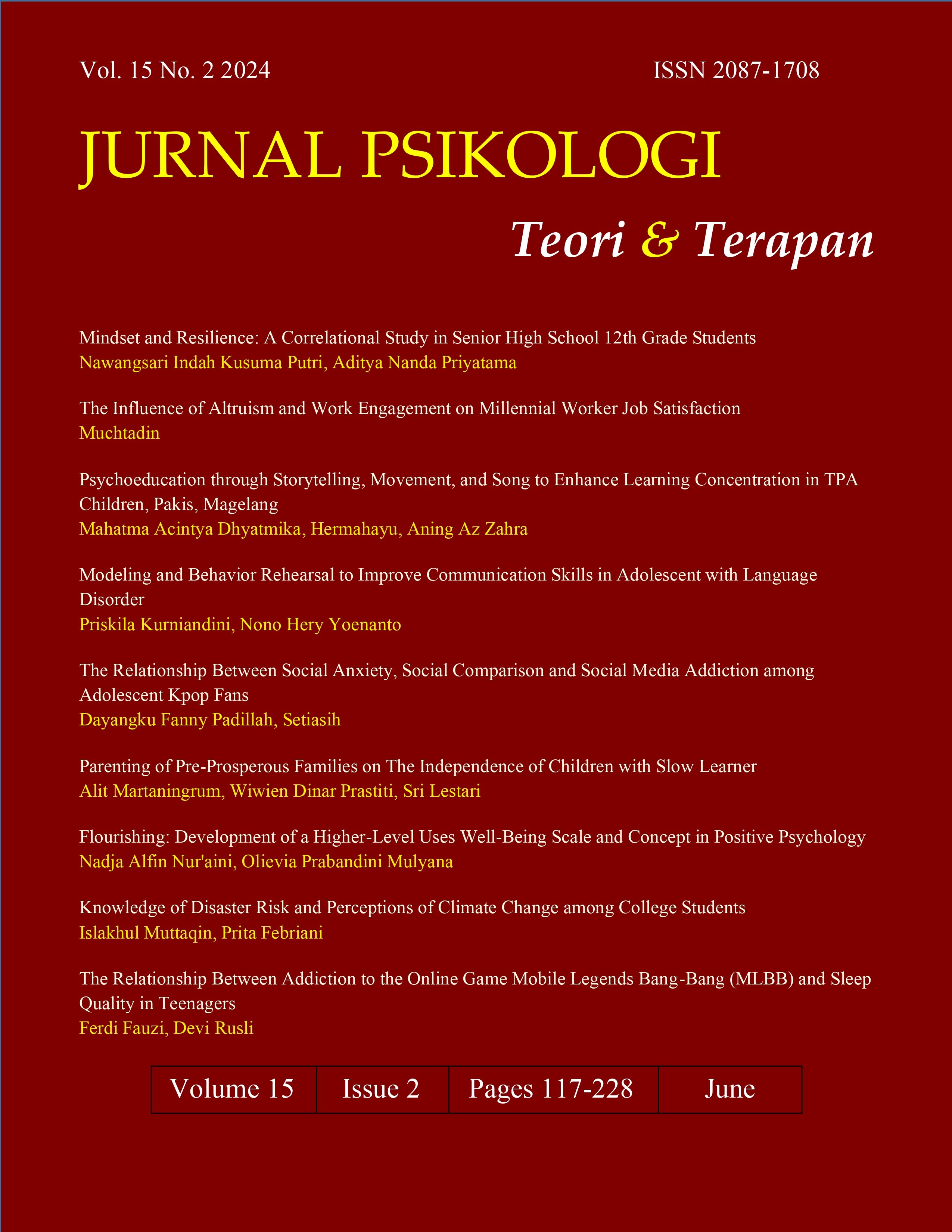The Relationship Between Social Anxiety, Social Comparison and Social Media Addiction among Adolescent Kpop Fans
DOI:
https://doi.org/10.26740/jptt.v15n02.p164-175Keywords:
Social anxiety, social comparison, social media addiction, kecemasan sosial, perbandingan sosial, kecanduan media sosialAbstract
Background: Social media has become an essential part of the lives of people of all ages. Social media has both positive and negative effects on a teenager's life. This is because teenagers are often unable to control their use of social media. Objective: The purpose of this study was to analyze the effect of social anxiety (X1) and social comparison (X2) on social media addiction. Method: This study uses a correlational quantitative approach. The sample in this study consisted of young Korean pop music fans who actively used social media. As many as 377 samples were employed using a purposive sampling technique. The analysis technique in this study uses multiple linear regression analysis. Results: The results in this study, namely social anxiety and social comparison, have a significant positive effect on social media addiction. Conclusion: The research results also found that simultaneously the variables Social Anxiety and Social Comparison have a significant effect on Social Media Addiction.
Abstrak
Latar Belakang: Media sosial telah menjadi bagian penting dari kehidupan sebagian besar individu dengan berbagai kalangan usia. Media sosial memiliki efek positif dan negative pada kehidupan remaja. Hal ini disebabkan oleh fakta bahwa remaja seringkali tidak dapat mengendalikan penggunaan media sosial mereka. Remaja yang terjerat kecanduan media sosial cenderung sangat bergantung pada platform tersebut, bahkan rela mengorbankan banyak waktu demi mewujudkan keinginannya. Tujuan: Tujuan dari penelitian ini adalah untuk menganalisis pengaruh social anxiety (X1) dan social comparison (X2) terhadap social media addiction. Metode: Penelitian ini menggunakan pendekatan kuantitatif korelasional. Sampel dalam penelitian ini adalah remaja penggemar musik Korean pop yang aktif menggunakan sosial media sebanyak 377 sampel dengan menggunakan teknik purposive sampling. Teknik analisis dalam penelitian ini menggunakan analisis regresi linier berganda. Hasil: Hasil dalam penelitian ini yaitu social anxiety dan social comparison secara berpengaruh signifikan positif terhadap social media addiction. Simpulan: Hasil penelitian juga ditemukan bahwa secara simultan variabel Social Anxiety dan Social Comparison berpengaruh signifikan terhadap Social Media Addiction.
References
Apiji. (2022). Asosiasi penyelenggara jasa internet indonesia. Apiji.or.id
Ghozali, I. (2016). Aplikasi analisis multivariete dengan program IBM SPSS 23.
Johan, F. (2022). Hubungan antara social comparison dengan social media anxiety pada emerging adults pengguna Instagram. Universitas Surabaya.
Kaplan, H. I. (1997). Sinopsis psikiatri: Ilmu pengetahuan perilaku psikiatri klinis jilid 2 / Harold I. Kaplan, Benjamin J. Sadock, Jack A. Grebb; alih bahasa Widjaja Kusuma.
Silvia, S., & Appulembang, Y. A. (2022). Social comparison dengan fear of missing out pada remaja pengguna aktif media sosial. Jurnal Bimbingan dan Konseling Ar-Rahman, 8, 171. https://doi.org/10.31602/jbkr.v8i2.8984
Thakkar, V., & Collins, C. E. (2006). Addiction. Infobase Publishing.
Utami. (2021). Pengaruh Korean pop (k-pop) terhadap perilaku remaja di Desa Gumelar Kecamatan Balung Kabupaten Jember [Doctoral dissertation, ].
Downloads
Published
How to Cite
Issue
Section
License

This work is licensed under a Creative Commons Attribution-NonCommercial 4.0 International License.
Authors who publish in this journal agree to the following terms:
Copyright in any article is held by the author.
The author grants the journal, publication rights with the work simultaneously licensed under a Creative Commons Attribution License that allows others to share the work with an acknowledgment of the work's authorship and initial publication in this journal.
Authors may enter into separate, additional contractual arrangements for the non-exclusive distribution of the journal's published version of the work (e.g., posting it to an institutional repository or publishing it in a book), with an acknowledgment of its initial publication in this journal.
Authors are permitted and encouraged to post their work online (e.g., in an institutional repository or on their website) prior to and during the submission process, as this can lead to productive exchanges, as well as earlier and greater citation of published work.
 Abstract views: 1837
,
Abstract views: 1837
, PDF Downloads: 1213
PDF Downloads: 1213


















